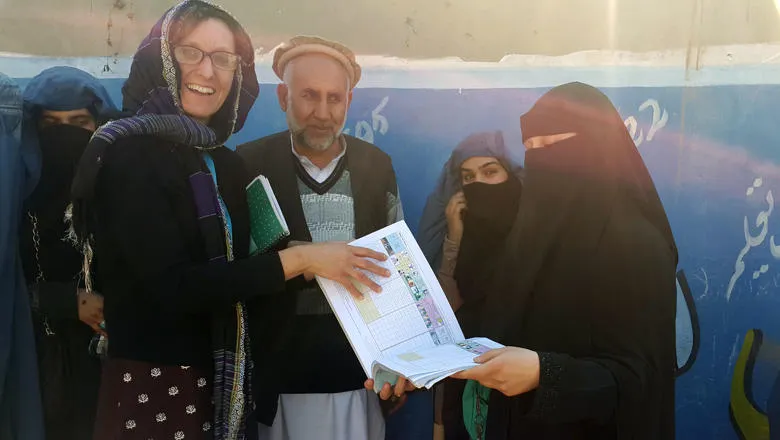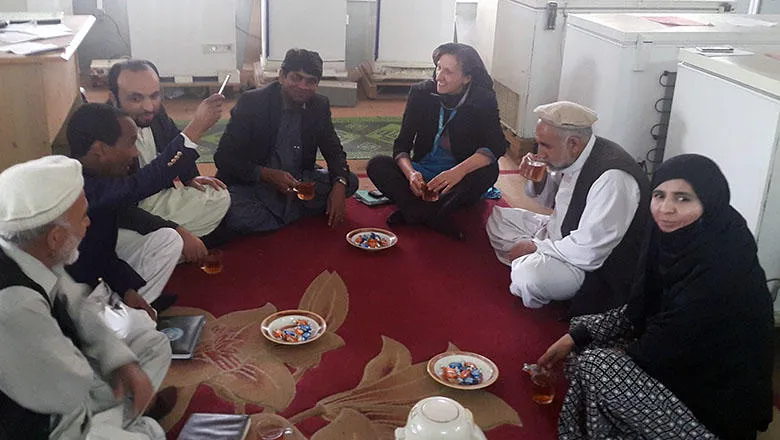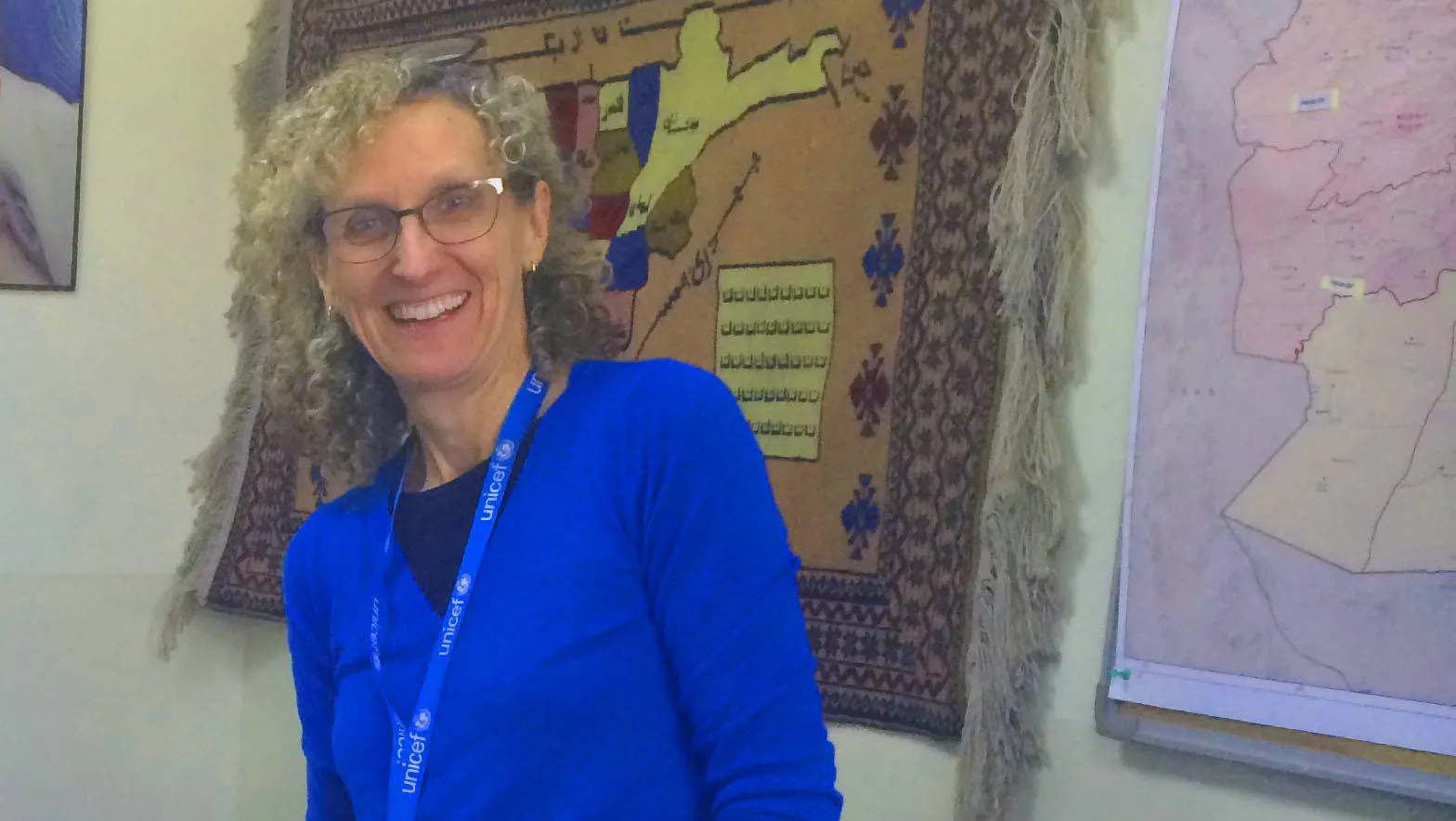15 April 2019
UNICEF Chief of Health to join King's
Professor Karen Edmond to join School of Life Course Sciences from UNICEF in Afghanistan

Karen Edmond, current United Nations Children's Fund (UNICEF) Chief of Health for Afghanistan, is soon to join the Department of Women & Children’s Health as Professor of Child Health.
Professor Edmond began her medical career as a consultant paediatrician and public health physician working in the deprived indigenous communities of northern Australia and has since held positions at the World Health Organisation (WHO), London School of Hygiene & Tropical Medicine and the University of Western Australia. She has over 100 peer reviewed publications and has led more than £23 million of research worldwide.
For the past 24 months Professor Edmond has been based in Kabul, Afghanistan where her work has focussed on delivering and evaluating care for women and children during humanitarian crises.
We sat down with Professor Edmond to discuss her career to date and plans for paediatrics at King’s.
When did you first know you wanted to be a doctor?
As a teenager I was clear; I wanted to be a doctor or a vet. I was successful at school, enjoyed science, particularly biology and chemistry, and found that I was good at solving problems in a scientific way. It wasn’t my only interest though as I’ve always loved literature, discussion and sharing ideas, so I knew I didn’t want a career without that human side.
From an early age I had the inclination to care for the vulnerable and I think this came from my family, where I saw up close the challenges of mental illness and the vulnerability it creates. Looking back, this is why I chose medicine over veterinary science. I decided I could solve bigger problems and make things better for more people. I made that choice in sixth form and, with hindsight, am delighted I did.
What do you wish you’d known as a medical student?
I wish our medical school had a greater focus on the importance of good data and how to interpret it. Medical innovation is guesswork without effective statistics and detailed epidemiology. These are the tools that we use to gather and understand the evidence so after my public health and paediatric training, I trained in epidemiology and statistics too.
I am, however, very pleased at how quickly I found paediatrics.
So, why paediatrics?
My first experience of it was in my fourth year of medical school, where we studied a series of three-month modules, and I loved it. A newborn baby is totally dependent and in no way responsible for their health. There are no grey areas; children are the most vulnerable and so, to my mind, the most deserving of care. It’s also such a positive field. You really feel you are able to make a difference and can see improvements with your own eyes day-by-day.
To come back to my choices at school, I also believe that paediatrics, of all medicine, has the potential to do the most good. My work has focused on infants up to one year old. The premise is clear – to save the youngest lives - plus I have always enjoyed being surrounded by new mothers, babies and toddlers. It’s a great leveller, enables you to see yourself and your work in perspective and reduces the hubris that some doctors are prone to. I never feel the need to justify the work I do. There is a moral imperative to care for children so to me it was always a no brainer.
What did you most want to achieve?
That’s a big question!
I suppose to generalise, I have always worked to improve primary care for the biggest number of disadvantaged children. Best to think of this as the front-line of a healthcare system. In richer countries normally a GP or similar but in low and middle-income communities often the only care available is from nurses and community health workers.
What I found particularly shocking early in my career, though, is the lack of primary care for disadvantaged women and children in rich countries with seemingly excellent healthcare. My first experience of this was the ten years I spent working with Aboriginal communities in Northern and Western Australia.
These communities are geographically isolated, marginalised and disenfranchised. Colonial history, racism, loss of ownership of land and culture all play their part. Alongside high rates of communicable diseases – like pneumonia and diarrhoea - there are many babies born malnourished, to mothers with poor mental health or substance addiction. I set out to design interventions and create “delivery channels” (ways of getting healthcare to where it’s needed) to reach the most disadvantaged mothers on the continent.
This led quite naturally to my ‘second life’, working internationally for the WHO in Geneva, the London School of Hygiene & Tropical Medicine in Ghana and later for UNICEF in Afghanistan. The big challenges to newborn survival have remained the same: prematurity, infection, breathing difficulties during and after labour. Reducing these has been my priority alongside improving neurodevelopment and nutritional outcomes.

What were the big difficulties of working in Afghanistan?
Personally, I’ve never felt significantly scared or anxious living and working in Afghanistan. I have been protected by the UN. Their processes are robust and promote the immediate implementation of care. UNICEF have a team of about 200 on the ground: 130 local and 70 international staff. We are well-funded, so our team is first class.
Our biggest challenge is access. Lots of international development focuses on big, high-tech, complex hospitals which are excellent but not much help to remote communities isolated by conflict. My main goal was to shift things towards mobile, community health workers who can navigate the warzones to reach those hardest hit.
The important thing to understand is that the fighting is not constant, it ebbs and flows and moves from place to place. The key to getting through are good local negotiators who can open safe corridors for us to travel.
Many countries in conflict don’t have mobile health teams, which seems crazy to me. Research has shown how effective they are and my hope for the next few years is to strengthen the evidence and make the case for more projects to take this approach.
What has most surprised you during your time there?
The local doctors and nurses are highly-skilled and incredibly positive. It’s not that they don’t know how to treat patients, but that they lack the facilities and supplies. Afghanistan has been a pawn in international politics for many years. The USA, Russia, Iran and Pakistan have all had significant influence and the World Bank has invested too, so many Afghani health workers have been trained elsewhere. This created an incredibly rewarding and productive environment for my team, as there was a pool of talented people to call upon.
How are things changing?
It is still a deeply conservative country, and I wouldn’t want readers to think otherwise, but there is a growing movement towards women’s freedom particularly in higher socio-economic society. There are inspirational women teachers, doctors and nurses who are working across Afghanistan today and I think their contributions are largely ignored by the outside world. There is also an incredible kinship between women that I would never have seen if I were a man. Although many women do wear a veil in public, the burqas all come off as soon as the men leave. Things then feel like any other mother and baby group I have been part of, with women sharing stories, asking advice and passing their babies back and forwards.

Why King’s?
King’s is at the centre of things. We are one hour from Geneva and six from New York. The UN is highly effective but is under such intense international scrutiny that it can’t take risks. I want the freedom to have ideas, lead programmes and push the agenda. King’s will give me that opportunity.
My skills are in the research and implementation of care but I don’t want to abandon my clinical work as it’s important to see medical problems from both perspectives. King’s is conducting extraordinary paediatric and global health research and has excellent links through the NHS to disadvantaged communities in Lambeth and Southwark too.
And lastly, what are your plans here?
My plan is to be inclusive of mothers and children and of care providers; working from laboratory to community. We will build on the hard work that has gone before to continue as leaders in epidemiology, population health and service delivery. I believe we have a clear way forward and that combining epidemiology with clinical skills can achieve so much for our children.
I am committed to outreach and delivering high quality care to the most disadvantaged women and their children in both low- and high-income countries. Continuing the excellent work across King’s Health Partners, I aim to take a ‘population health laboratory’ approach with an intense focus on training and capacity building in epidemiology for all our team. One important example is that we know home visits from health professionals work. They offer support during a particularly stressful time and have been shown to benefit babies and protect women’s mental and physical health. Such interventions may not be glamorous and so are often first to go when funding gets squeezed but I aim to help to prove just how essential they are.
Watch this space!
